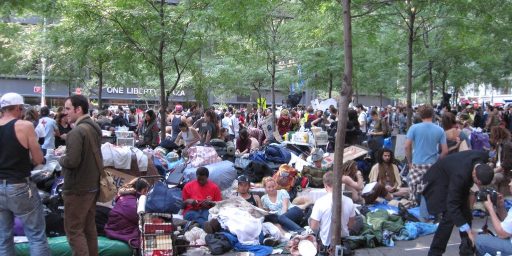Americans Have More Leisure Time Than Ever
A new study claims that, despite feeling stressed and overworked, Americans have more leisure time than ever before.
A pair of economists have looked closely at how Americans actually spend their time. Mark Aguiar (at the Federal Reserve Bank of Boston) and Erik Hurst (at the University of Chicago’s Graduate School of Business) constructed four different measures of leisure.* The narrowest includes only activities that nearly everyone considers relaxing or fun; the broadest counts anything that is not related to a paying job, housework or errands as “leisure”. No matter how the two economists slice the data, Americans seem to have much more free time than before.
Over the past four decades, depending on which of their measures one uses, the amount of time that working-age Americans are devoting to leisure activities has risen by 4-8 hours a week. (For somebody working 40 hours a week, that is equivalent to 5-10 weeks of extra holiday a year.) Nearly every category of American has more spare time: single or married, with or without children, both men and women. The only twist is that less educated (and thus poorer) Americans have done relatively better than more educated ones (see chart). And that is not just because unemployed high-school drop-outs have more free time on their hands. Less educated Americans with jobs—the overstretched middle class of political lore—do very well.
[…]
Messrs Aguiar and Hurst think that the hours spent at your employer’s are too narrow a definition of work. Americans also spend lots of time shopping, cooking, running errands and keeping house. These chores are among the main reasons why people say they are so overstretched (especially working women with children).
However, Messrs Aguiar and Hurst show that Americans actually spend much less time doing them than they did 40 years ago. There has been a revolution in the household economy. Appliances, home delivery, the internet, 24-hour shopping, and more varied and affordable domestic services have increased flexibility and freed up people’s time.
[…]
Do the numbers add up? One thing missing in Messrs Aguiar’s and Hurst’s work is that they have deliberately ignored the biggest leisure-gainers in the population—the growing number of retired folk. The two economists excluded anyone who has reached 65 years old, as well as anyone under that age who retired early. So America’s true leisure boom is even bigger than their estimate.
[…]
But why do Americans feel so harried? Weirdly, prosperity may be to blame in two ways. First, thanks to rising real incomes, an American’s time is worth more now. A walk in the park is more expensive than it used to be. (When people complain to him about being too busy, Mr Hamermesh tells them that their real problem is too much money.) Second, economic advances allow people to squeeze ever more possible activities, both work and leisure, into a day, which encourages people to try to do too much.
[…]
Finally, there is the changing nature of work. Mobile phones and e-mail make people accountable on short notice, and competition may make them less secure in their jobs. So even if they are playing golf or walking in the park, they may feel as if they are working. It is surely nicer to feel overworked in the park than to be overworked at the office, but few Americans seem to look at it that way. Think about that in your spare time.
The methodology here is rather troubling, though, in measuring leisure.
To say, for example, that a woman who works at a high stress office job eight hours, commutes ninety minutes, and does ninety minutes of household chores each day has more leisure time than her 1970s counterpart who stayed home with the kids is absurd. Sure, she might log fewer hours of “work” but she is certainly more stressed.
Similarly, going out to dinner, considered a pleasant leisure activity not that long ago, has become routine. So, going out to dinner for ninety minutes times two people counts as an extra three hours of leisure time for the couple. If the stay-at-home wife was previously cooking that meal, she probably logged it as two hours of housework, although in reality it was more like twenty minutes of actual work done over the course of a couple hours. So, a single dinner out might count as a net leisure gain of five hours for the couple. But is it really? It basically means coming home and having very little time to relax before going to bed to get ready for the next workday. If the couple has small children, scratch that relaxation time.
Other activities that were once “leisure” have often become much like “work.” When I was a kid, going outside the play was rather clearly “leisure.” Now, it is too often an orchestrated event requiring adults to synchronize their schedules and get the kids to and from a series of structured events.
Is going to the gym to “work out” classified as leisure or work? In the past, people went because they enjoyed it or as a way of blowing off steam. Now, most people go because they feel pressured to do so for health or competitive reasons.
Even newer activities such as blogging blur that line. It starts off as pure recreation but can easily take on many “worklike” attributes.
Between commuting, working, instant communicating, and constant overscheduling, we are very stressed as a society. Many people are tethered to Blackberries, cell phones, and email 24/7. Being “on call” at home is not work but it is not pure leisure, either. For many of these folks, even weekends, holidays, and family vacations involve the need to be in contact with the office or, at a minimum, spend some substantial time thinking about work. That’s not exactly conducive to relaxation.
On the other hand, we may have more goof-off time at work than previous generations. We don’t have water coolers to hang around anymore but we do have the Internet. While our work crowds into our leisure time, our leisure time crowds into our work.
It is hard to deny that our economic lives are better in almost every way from that of our generational forebearers. As stressful as white collar work can be, it beats farming, coal mining, and other back breaking manual labor. We drive nicer cars, live in bigger houses, have more toys, and have much more disposable income than our grandparents could have imagined.
Pejman Yousefzadeh and Dan Drezner have thoughts on this piece as well.






Of course this doesn’t apply if they’re bloggers.
>To say, for example, that a woman who works at a high stress office job eight hours, commutes ninety minutes, and does ninety minutes of household chores each day has more leisure time than her 1970s counterpart who stayed home with the kids is absurd.
Spoken like a newly married man. 😉
I feel stressed becuse I got to bust my ass all day at a real job so I can pay for others to sit on their ass and complain about how the goverment is not taking more of my hard earned money so that others can sit on their asses becuse they got some sob story about why their wast of a life is my fault. And what in the great blue hell is this thing they call leisure time any how. If your talking about playing marbles with the brains of liberals, I call it my duty. could they be talking about when I got a few extra bucks to have a nice meal once a week, or a few extra bucks to go see a nice gay cowboy movie? Dang I am starting to sound like a liberal, so sorry.